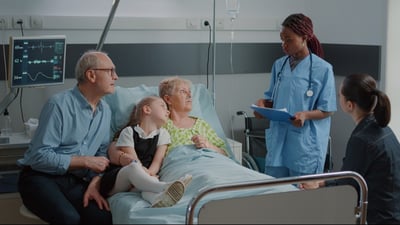Detrás de los titulares sobre el cáncer
Obtener más información sobre el programa de XRAY



Relevancia: Media-alta
Este artículo es de mayor interés para: Personas con una mutación hereditaria que aumenta el riesgo de cáncer de quienes les interesa su salud sexual.
Estudio: Factores que afectan el bienestar sexual de las personas con una mutación hereditaria en el gen BRCA
Este estudio analizó el bienestar sexual en las personas con mutaciones hereditarias en los genes BRCA1 o BRCA2. Saber que hay una mutación hereditaria en el gen BRCA1 o una mutación en el gen BRCA1 no tuvo un impacto en la salud sexual. Sin embargo, el diagnóstico de menopausia y cáncer si afectó de manera importante la salud y la función sexual.
Leer más ›


Relevancia: Media-alta
Este artículo es de mayor interés para: Personas con una mutación en los genes BRCA1 o BRCA2 que se sometieron a una cirugía preventiva para retirar los ovarios.
Estudio: El riesgo de cáncer peritoneal es menor en personas con una mutación hereditaria en el gen BRCA después de la cirugía
El riesgo de cáncer peritoneal es menor en personas con una mutación hereditaria en los genes BRCA1 o BRCA2 después de la cirugía preventiva para retirar los ovarios (conocida como ooforectomía). El riesgo se redujo aún más cuando las personas se sometieron a una cirugía preventiva a una edad más temprana y después de 2005 cuando en la cirugía se incluyó retirar las trompas de Falopio. Los resultados de esta investigación apoyan la teoría de que, al igual que el cáncer de ovario, el cáncer peritoneal comienza en las trompas de Falopio, lo que refuerza la recomendación para someterse a la cirugía preventiva a esta edad. (3/20/25)
Leer más ›


Relevancia: Media-alta
Este artículo es de mayor interés para: Personas con un riesgo más alto de tener cáncer hereditario
Directrices: Ampliación de las directrices genéticas del cáncer hereditario
La Red nacional integral del cáncer constantemente actualiza las directrices de tratamiento para varios tipos de cáncer hereditario. Por lo general, las recomendaciones se cambian cuando se publica una nueva investigación. Recientemente, la Red nacional integral del cáncer (NCCN, por sus siglas en inglés) amplió sus directrices para incluir información sobre los cánceres hereditarios de estómago y de próstata. (Publicado el 1/6/25)
Leer más ›


Relevancia: Media-alta
Este artículo es de mayor interés para: Personas con cáncer interesadas en consumir cannabis para ayudar a tratar los síntomas.
Estudio: Consumo de cannabis para manejar los síntomas del cáncer
Entre las personas con cáncer, hay un gran interés por el consumo de cannabis para manejar los síntomas del cáncer y los efectos secundarios del tratamiento. La principal organización profesional de oncólogos (especialistas en el tratamiento contra el cáncer) del mundo ha publicado estrategias para ayudar a los adultos con cáncer y a los profesionales médicos a mantener conversaciones abiertas y sin prejuicios sobre el consumo de cannabis para tratar los síntomas del cáncer. (Publicado el 27/9/24)
Leer más ›


Relevancia: Alta
Este artículo es de mayor interés para: Personas que sobrevivieron al cáncer
Tema: La acupresión como método para aliviar los síntomas del cáncer
La acupresión es un tratamiento seguro que puede utilizarse para aliviar algunos síntomas del cáncer y los efectos secundarios del tratamiento. La aplicación de una ligera presión en puntos clave del cuerpo puede ayudar a aliviar la fatiga, el sueño, las náuseas y posiblemente también otros síntomas. (Publicado el 7/8/24)
Leer más ›


Relevancia: Media-alta
Este artículo es de mayor interés para: Personas con cáncer HER2+ avanzado
Tema: El medicamento Enhertu recibió la aprobación de la FDA para el tratamiento de cualquier tipo de tumores HER2+ avanzados o metastásicos
Enhertu recibió la aprobación acelerada de la FDA en personas con cualquier tipo de tumor HER2+ metastásico o que no se puede extirpar quirúrgicamente. Los pacientes elegibles deben haber recibido algún tratamiento anteriormente, como quimioterapia o tratamiento hormonal. (publicado el 19/7/24)
Leer más ›


Relevancia: Media-alta
Este artículo es de mayor interés para: Pacientes de cáncer
Tema: Los especialistas exhortan a la provisión de cuidados paliativos desde las etapas iniciales para pacientes de cáncer
Las personas con cáncer necesitan apoyo y cuidados no solo en la etapa final de la vida, sino desde su diagnóstico. En su congreso anual de 2024, la presidenta de la Sociedad Estadounidense de Oncología Clínica (ASCO, por sus siglas en inglés) instó a los profesionales de la salud a hacer de los cuidados paliativos un elemento central en el tratamiento del cáncer. (publicado el 17/7/2024)
Leer más ›


Relevancia: Media-alta
Este artículo es de mayor interés para: Personas con cáncer de ovario.
Actualización: Boletín de la FDA: nuevo tratamiento para el cáncer de ovario y medicamento para diagnóstico por imágenes
Recientemente, la FDA aprobó un nuevo tratamiento para las personas con cáncer de ovario. Además, la FDA aprobó un nuevo medicamento para diagnóstico por imágenes que puede ayudar a los cirujanos a encontrar y retirar el cáncer de ovario. (Publicado el 30/5/24)
Leer más ›


Relevancia: Alta
Este artículo es de mayor interés para: Personas que se han sometido a una ooforectomía bilateral (retirar ambos ovarios con cirugía) para disminuir el riesgo de padecer cáncer
Estudio: El retiro de los ovarios con cirugía disminuye el riesgo de muerte por cualquier causa en las personas con mutaciones en el gen BRCA
Las personas que dan positivo a una mutación hereditaria en el gen BRCA1 o BRCA2 pueden disminuir el riesgo de padecer cáncer de ovario al retirarse los dos ovarios y las trompas de Falopio con cirugía. En un estudio publicado en 2024 se descubrió un beneficio adicional de esta cirugía, es decir, que disminuye el riesgo de muerte por cualquier causa antes de la edad de 75 años. (Publicado el 23/5/24)
Leer más ›


Relevancia: Alta
Este artículo es de mayor interés para: Personas con un diagnóstico de cáncer que no se han realizado pruebas genéticas
Estudio: Las pruebas genéticas en las personas con cáncer pueden ayudar a descubrir mutaciones que podrían afectar el tratamiento y la prevención
A pesar de que las directrices nacionales recomiendan la realización de pruebas genéticas, menos del 10 % de los pacientes elegibles se las realizaron dentro de los dos años siguientes a su diagnóstico de cáncer De las personas que se realizaron pruebas, entre el 10 y el 30 % de ellas poseían una mutación hereditaria que podía influir en su atención médica. (publicado el 15/3/2024)
Leer más ›